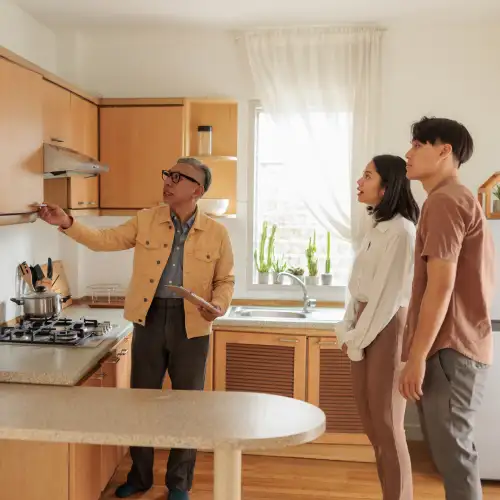Is it better to buy or rent a home?
To buy or not to buy? That is the question. Imagine Shakespeare scratching his head, quill in hand, trying to fathom the complexities of today’s housing market. While he may not have pondered interest rates or property taxes, we certainly must.
But don’t fret, dear reader—help has arrived. Let’s journey into the “rent vs. buy” landscape of modern real estate, where each option comes with upsides to consider. (Please, hold your applause till the end.)
Renting a home
Is it better to rent or buy a home? Well, it depends. While renting can feel like you’re a perpetual guest in someone else’s house—which, technically, you are—it does come with its share of perks. You simply pay your rent monthly and, if you’re lucky, it includes Wi-Fi, water and other necessities. Budgeting, for the most part, is a no-brainer.
Renting also works for people who want flexibility and minimal responsibility. Clogged drain? Call the maintenance crew. Lock yourself out? Call again while apologizing profusely. And when you’re ready to move, it’s as easy as not renewing your lease. Renting is beneficial if you’re exploring far-off job opportunities, experiencing wanderlust or moving cross-country for love. Hey, we promised to keep it interesting, didn’t we?
However, renting isn’t always drama-free. Does your landlord move at a snail’s pace when the fire ants take up residence? Is the annual suspense of a rent hike (or worse, a request to vacate) more than your nerves can handle? Is your repertoire of renter tales 40 volumes high? Read on…
Owning a home
Now, let’s step into the world of homeownership. Turn that house key and you’ll feel like the king or queen of your castle. This is where the magic happens! You can finally paint those walls your favorite colors. You’re free to adopt a Puggle without anyone’s approval. And (drumroll please) you can install that stunning swimming pool as soon as you save enough dough.
Homeownership is never just about having a place to live; it's about creating a personal sanctuary that reflects your style and interests.
Of course, every castle comes with costs. From saving for the down payment to handling ongoing maintenance, owning a home requires a serious financial commitment. It’s a long-term relationship with your property, complete with plenty of ups and downs.
But there’s a big silver lining to this scenario. With every mortgage payment, you’re building equity. Growing equity not only has the potential to increase your financial wellbeing—it can help you invest in future opportunities and secure loans based on the value of your home.
Growing equity not only has the potential to increase your financial wellbeing—it can help you invest in future opportunities and secure loans based on the value of your home.
The benefits of building equity
When you buy a home, part of your monthly mortgage payment goes towards paying off the loan's principal (the amount you borrowed), and part goes towards interest. Over time, as you pay down the principal, you build equity in your home. Equity is the portion of the home you truly "own." If the home's value increases, your equity could grow even more.
In contrast, when you rent, all your monthly payments go to the landlord and you don't build any equity or ownership in the property.
Home equity in action
Let’s look at a home buying scenario where we’ll see the accumulation of equity over 10 years.
- Home purchase price: $500,000
- Down payment: $100,000 (20%)
- Loan amount: $400,000
- Monthly mortgage payment: $2,719.20
- Interest rate: 6.8%
- Mortgage term: 30 years
- Rent: $2,500/month (for comparison)
- Rent payments assume no rent increases, which is often not the case.
After a decade of owning, you could be sitting on a nice little equity nest egg of $264,589. By contrast, renting for the same length of time could cost you around $300,000.
Renting vs. buying a house: which is better for me?
For many, owning a home is an investment that provides a sense of stability and permanence. You have the freedom to customize your space and potentially build equity over time. However, it also comes with extra responsibilities like maintenance, repairs and property taxes.
Renting, on the other hand, offers more flexibility. It's generally easier to move if you get a new job or you just want a change of scenery. Plus, you don't have to worry about the costs of upkeep and repairs—that's usually the landlord's responsibility.
Let’s break down some of the main things people consider before choosing between buying and renting.
Reasons to consider buying a home now
Every mortgage payment is a step towards savings
Think of each mortgage payment as a little deposit into your future equity. It's not just spending; it's investing in your future self! Building equity in your home can open up a world of possibilities. You have the option to take out a loan or line of credit against your equity for investing in everything from home improvements to remodeling and more.You're buying more than walls and a roof
Owning a home is about creating a lifestyle. From hosting your own backyard barbecues to designing your dream kitchen, owning a home is an experience that’s tough to replicate with a rental.Stability in your monthly payments
When you own your home, fixed-rate mortgage payments can be more predictable than often-fluctuating rent prices. It’s nice to have one less thing to worry about!Potential tax benefits
Come tax season, being a homeowner might just put a smile on your face. Homeownership can sweeten your tax situation significantly. You might be able to deduct mortgage interest and property taxes on your federal income tax return. And, when it comes time to sell, you could qualify for a capital gains exclusion, meaning you might not have to pay taxes on the profit from the sale up to a certain limit. Consult a tax advisor about your particular situation.Earn extra income
Got a spare room or a basement? Your home can become a source of income through renting out these spaces. However, this could affect your taxes. If this is something you’re interested in, make sure to chat with a Citi Specialist who can advise you on how to plan ahead.
Reasons you may consider renting for now
More wallet-friendly
Renting can be less of a financial burden than buying. You can enjoy living in a great place without the hefty price tag of owning it.Freedom to roam
Renting offers the flexibility to move around without the hassle of selling a house. It’s perfect for those who love to keep their options open.Say goodbye to maintenance hassles
One of the perks of renting? Most repair and maintenance issues are your landlord’s problem, not yours. More time for relaxing!Fewer financial commitments
Renting often requires fewer financial compromises than buying. You can maintain your lifestyle with more freedom to allocate funds to travel, hobbies or starting a business.Lower initial costs
The initial costs of renting—like security deposits—are generally lower than the down payments needed for buying a home. It’s easier on your bank account up front.No worries about property value
As a renter, you won’t lose sleep over housing market fluctuations. Your investment isn’t tied to property values.Skip the extra costs
Forget about property taxes, homeowner's insurance and other ownership expenses. Renting keeps it simple and straightforward.
Is renting cheaper than owning a home?
In the short term, renting often appears less costly. You pay less up front and aren’t stuck with repairs and maintenance. However, this outlook is somewhat limited.
Owning a home, while initially more costly, is the kind of investment that can bring dividends over time. Those monthly mortgage payments build equity. That’s money in the bank, so to speak. As your property value increases, equity grows even faster. And with a fixed-rate mortgage, that monthly payment stays steady.
Is homeownership a good investment?
While the journey might be peppered with surprise repairs and occasional headaches, the long-term benefits of ownership can outweigh the hiccups.
The ability to build equity can hardly be over-hyped. It turns monthly payments into a form of “forced savings” that can contribute to one's net worth. Homeowners can also benefit from tax deductions related to mortgage interest and property taxes. And the joy of homeowning, plus the freedom to personalize your living space, bring intrinsic value that goes far beyond financials.
Cue the flipside: Homeownership means you’re footing the bill instead of your landlord. When the roof needs replacing, there’s no understudy waiting in the wings to cover for you, and the prep work is no small production. Homeownership also takes saving for a down payment, maintaining good credit and having a solid work history. The real estate market can fluctuate as well, meaning property values can rise and fall. For some, renting is simply a better fit, and that’s perfectly fine.
So, to buy or rent? Is this still the question? Feel free to share your dreams with a mortgage expert who will listen to your ideas and help you script a happy ending.







